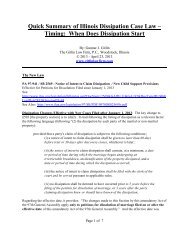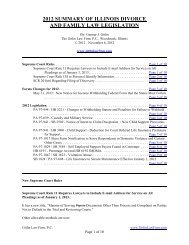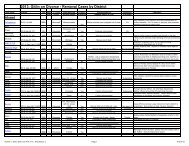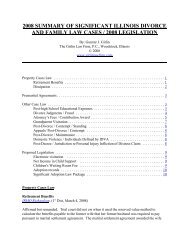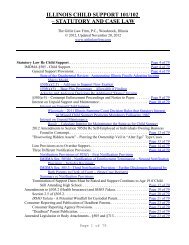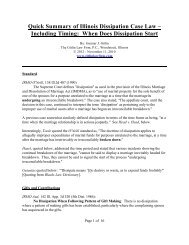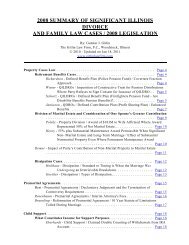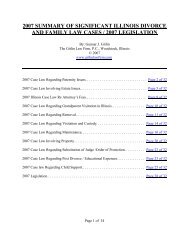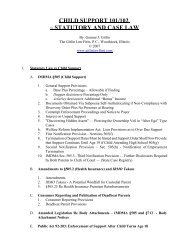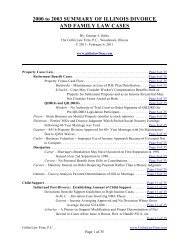Illinois Attorney's Fees and the Leveling the Playing Field Act
Illinois Attorney's Fees and the Leveling the Playing Field Act
Illinois Attorney's Fees and the Leveling the Playing Field Act
Create successful ePaper yourself
Turn your PDF publications into a flip-book with our unique Google optimized e-Paper software.
Even if <strong>the</strong> lawyer is given notice of <strong>the</strong> final hearing, in many cases <strong>the</strong> parties often choose that<br />
<strong>the</strong> former client (who has <strong>the</strong> lesser ability to pay for attorney's fees), will pay exclusively for<br />
any attorney's fees. Because this is often <strong>the</strong> scenario, I have drafted a two-count petition which<br />
incorporates both a request for fees from <strong>the</strong> client as well as a request for fees from <strong>the</strong><br />
opposing party. It could be argued on behalf of <strong>the</strong> former client that <strong>the</strong> lawyer does not have<br />
privity with which to bring such a petition. The counter-argument to this, however, is <strong>the</strong> Lee v.<br />
Lee decision, 302 Ill.App.3d 607, 236 Ill.Dec. 222, 707 N.E.2d 67 (1st Dist. 1998), GDR 99-2.<br />
Lee held that <strong>the</strong> parties cannot, by a marital settlement agreement provision, provide that each<br />
party will be responsible for his <strong>and</strong> her own attorney's fees <strong>and</strong> thus preclude an attorney from<br />
seeking fees against <strong>the</strong> party with <strong>the</strong> greater ability to pay. However, <strong>the</strong> fee petitions in Lee<br />
were heard at a time prior to <strong>the</strong> enactment of <strong>the</strong> “<strong>Leveling</strong>” amendments.<br />
The danger, however, to <strong>the</strong> lawyer in pursuing such a petition where <strong>the</strong> former client does not<br />
want to seek an award of fees from <strong>the</strong> former spouse is <strong>the</strong> possibility of receiving an ARDC<br />
complaint from <strong>the</strong> former client. The reason such a complaint is a significant possibility is that<br />
<strong>the</strong> discharged lawyer will be seen as st<strong>and</strong>ing in <strong>the</strong> way of an agreement that has ostensibly<br />
been reached between <strong>the</strong> parties as to all issues.<br />
Most lawyers are aware of <strong>the</strong> studies showing a client's satisfaction in a divorce case is highest<br />
at <strong>the</strong> commencement of litigation <strong>and</strong> shortly before <strong>the</strong> prove-up of <strong>the</strong> case. After <strong>the</strong> case is<br />
concluded, <strong>the</strong> client's reported satisfaction with <strong>the</strong> lawyer steeply declines. Thus, <strong>the</strong> lawyer<br />
who seeks to be paid a substantial amount of attorney's fees following resolution of <strong>the</strong> case<br />
faces a client who usually no longer perceives a great value for <strong>the</strong> services rendered. The<br />
manner in which <strong>the</strong> <strong>Leveling</strong> amendments are drafted ensure that a lawyer cannot sue <strong>the</strong><br />
former client until after <strong>the</strong> ex-client's perceived value for services rendered is at its lowest point.<br />
Thus, <strong>the</strong> unintended consequence of <strong>the</strong> <strong>Leveling</strong> amendments has been that fewer lawyers will<br />
agree to defer being paid for services rendered until <strong>the</strong> conclusion of <strong>the</strong> case. Certainly this<br />
result could be perceived as being consumer-hostile because many spouses greatly in need of<br />
quality representation cannot afford to pay for <strong>the</strong> same while <strong>the</strong> case is progressing. Under <strong>the</strong><br />
<strong>Leveling</strong> amendments, such litigants often find it more difficult to find appropriate<br />
representation. Keep in mind that one of <strong>the</strong> significant goals of <strong>the</strong> legislation was to recognize<br />
<strong>and</strong> codify <strong>the</strong> perceived conflict of interest where a lawyer sues his own client for attorney's fees<br />
while a case progresses.<br />
While it can be argued that <strong>the</strong> provisions for interim attorney's fees make it easier to obtain fee<br />
awards while a case progresses, <strong>the</strong> awards are usually only a very small percentage of <strong>the</strong><br />
overall fees incurred. Nearly eight years of experience with <strong>the</strong> <strong>Leveling</strong> amendments has<br />
demonstrated that <strong>the</strong> interim fee portion of <strong>the</strong> statute has a limited impact on an attorney's<br />
ability to be paid for services rendered while a case progresses.<br />
Interim <strong>Fees</strong> <strong>and</strong> Parentage <strong>and</strong> Post-Divorce Applicability: Additional complexity with <strong>the</strong><br />
<strong>Leveling</strong> amendments is caused by <strong>the</strong> legislation not yet being fur<strong>the</strong>r amended to specify<br />
whe<strong>the</strong>r <strong>the</strong> interim fee provisions apply to parentage proceedings. As is addressed below, <strong>the</strong>re<br />
Gunnar J. Gitlin Gitlin Law Firm, P.C. www.gitlinlawfirm.com




